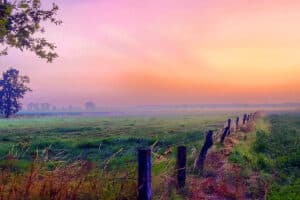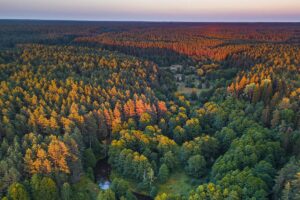There’s no getting around it. Buying rural land for sale takes a lot of money! At the same time, it is a good investment and a safe place to put money, whether it’s your own money or someone else’s (borrowed) money. Before you start looking, it’s wise to give both options careful consideration.
Debt can be very useful. It enables you to buy more land. It lets you keep available cash free for other needs. And, many investors like the way debt can result in a better return on equity. The downside of debt is that someone will eventually want their money back.
There are plenty of reasons why it’s a good idea to invest in land. However, to be fair, sometimes it’s not a good idea to borrow money to buy land. Debt should be avoided when the purchase is based on a need to put cash into land – debt would be counter-productive; or, if there is insufficient cash flow from other non-land sources to make the payments – and don’t count on there being enough income from timber, hunting, farming, field leases, pine straw, pine stumps, firewood, dirt, rock, mushrooms or Ginseng to make the payments. Unless your loan is very small, there won’t be.
Also, you’ll want to consider the things facing you over the next decade or two such as college expenses, retirement plans or maintaining living standards. Your accountant or financial planner can help you keep the decision to borrow money realistic.
With that said, let’s assume you have decided that using debt to buy land is a smart thing to do. Here are your options and how it works:
Owner Finance
Sometimes a seller will agree to finance part of the purchase price. This can be beneficial for both the buyer and the seller. Here’s why:
For the seller, the benefits include favorable tax consequences. It is also a means to generate regular cash flow and a way to get a better interest rate than a CD at the local bank. Then too, it can be an inducement to make a sale that might not happen otherwise.
Benefits to the land buyer may include a below-market interest rate (compared to a bank loan), or an approval process that may be less stringent than at a commercial bank. However, you should expect to have good credit just as you would for a commercial loan. When you request owner financing, many sellers suspect you have already failed to qualify for a commercial loan.
Negotiated issues include the sale price, down payment, interest rate, timing of payments and length of loan. For example, as an owner, the closer you get to my price, the more likely I am to negotiate on other points like the down payment or interest rate. Another example: if you’ve paid 50% up front, I might agree to a longer term than if you paid 5% up front.
Commercial Banks
As a general rule, commercial banks hesitate to make loans on unimproved rural land.
The reason is banks lack experience with the asset and struggle with valuation and risk issues. For example, they may not know who to call for an appraisal. They may lack underwriting staff to interpret outside appraisals, measure the income potential of a timber tract, or assess risk associated with common title issues. Their lending experience is primarily cars, houses and commercial enterprises.
When commercial banks make a loan secured by unimproved rural land, they often compensate for their lack of understanding with shorter terms, higher rates, or a lower loan-to-value ratio.
Exceptions to this rule would be banks with trust departments containing large amounts of natural resources and people to manage them. Another exception is land buyers who have a preferential relationship with a commercial bank; or, who don’t need much money; or, who are willing to pledge additional assets.
Farm & Ag Credit Banks
Farm and agriculture credit banks are specialized banks that love to make loans on rural land.
They have farming and forestry specialists on staff, and they employ appraisers who do nothing but value rural land and associated assets like timber, farm operations & equipment, etc. These credit banks are borrower-owned, have a variety of programs including variable rate loans and fixed rate loans from 2 to 20+ years, and they tend to have high loan-to- value ratios (75% to 80%). With some conditions, you can switch from a variable rate to a fixed rate or a fixed rate to a variable rate. Neither have pre-payment penalties.
Many farm and agriculture credit banks have long histories in the rural land markets. Farm Credit has been fulfilling its mission of helping rural America grow and thrive for more than a century.
Your IRA / 401(k) Plan
The Internal Revenue Service allows qualified retirement plans to invest in real estate, including rural land. This is not hard to do, but specific criteria must be followed.
Important points include:
- You must set up a self-directed retirement account with a Qualified Custodian. Rollover IRA, SEP IRA, Roth IRA & 401(k) retirement accounts are allowed. Land is titled in the Custodians name FBO the beneficial owner.
- Land may not be bought from disqualified persons such as the IRA owner or family. The IRA beneficiary (you) makes all the investment decisions, not the Custodian. Expenses are paid out of the account, and income must return to the account.
- Taxes are deferred as with any retirement account. No “indirect benefits‟ from the assets allowed (ex: living in a house owned by the IRA. However, renting the house is allowed.)
- Cash must be available in the IRA for managing the property.
- Use of debt is allowed but must be “without recourse‟, the debt must be serviced by the IRA and can result in Unrelated Business Income Tax (UBIT).
- You are allowed to buy an undivided interest in a property, or purchase along with other people.
- You may not borrow money from it, sell already owned property to it, receive unreasonable compensation for managing it, use it as security for a loan, or buy property for personal use. Qualified Custodian cost start at $200/year, and run up depending on the size of the deal & services provided.
This content may not be used or reproduced in any manner whatsoever, in part or in whole, without written permission of LANDTHINK. Use of this content without permission is a violation of federal copyright law. The articles, posts, comments, opinions and information provided by LANDTHINK are for informational and research purposes only and DOES NOT substitute or coincide with the advice of an attorney, accountant, real estate broker or any other licensed real estate professional. LANDTHINK strongly advises visitors and readers to seek their own professional guidance and advice related to buying, investing in or selling real estate.










Interesting I enjoy the read. Thanks.
What about USDA loan guarantees, can we use that?